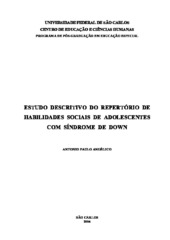Estudo descritivo do repertório de habilidades sociais de adolescentes com síndrome de Down.
Abstract
Social skills have been considered essential in the process of social adjustment for all individuals whether or not they have special education needs. This research used direct (videotaping) and indirect (parent interviews, empathetic discrimination behavior registration and teacher questionnaires) observational methodology to investigate the verbal and non-verbal social behavior repertoires of a group of ten adolescents with Down s Syndrome. A predominance of pro-social behaviors were found for participants in contrast to the self assertiveness responses exhibited, showing a weak relationship (r = 0,260, p > 0,05) between these two classes of skills, which may be due to their being distinct classes of behavior skills acquired under specific learning contingencies. A prevalence of reactive responses was found for the majority, with the exception of four participants. One participant demonstrated a balance in pro-active and reactive responses to the environment in his repertoire (51,3% and 48,7%, respectively), one participant showed a homogeneous frequency distribution for both these classes. A strong relationship between pro-active responses and self-assertiveness behavior (r = 0,866, p < 0,01) was found for the participants, confirming that the greater the frequency of pro-active conduct by individuals,
the greater the frequency of self-assertiveness skills. In the structured situations used for this research, a majority of the participants presented a deficit in self-assertiveness responses in their behavior repertoire. This may indicate the need for preventive educational interventions to guarantee an improved performance in situations which demand self-assertiveness behaviors. In the structured situation, eight participants showed inconsistent responses in discrimination of
facial expressions in figures with caricatured faces, indicating a deficit in empathetic social skills for perception and recognition of emotions felt by others. No relation was found between the social skills repertoire for participants and variables such as age, gender, and socio-economic class.
